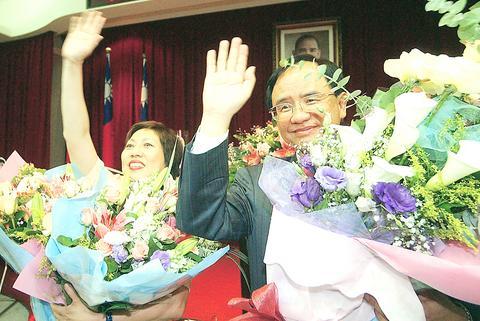Carrying bouquets and blessings from colleagues, outgoing Minister of Economic Affairs Lin Yi-fu (
"I'm very grateful for the efforts of the whole ministry staff ... Without their hard work, we would have not accomplished what we have during the past two years," Lin said.
Lin accepted an offer on Tuesday from Premier Yu Shyi-kun to serve as minister without portfolio, starting today.

PHOTO: LIU HSIN-TEH, TAIPEI TIMES
"I hope to play a role as a good policy-maker in drafting laws, as well as being an efficient coordinator to resolve disputes among government departments," he said of his new job.
Lin, 62, was promoted to minister from vice minister in March 2002. He became the third economic minister during the first four-year term of Chen Shui-bian's (
Lin joined the ministry in 1966. He was trade representative in Australia, the Philippines, Thailand and Toronto, Canada, between 1972 and 1980 before serving in the Bureau of Foreign Trade between 1990 and 2000.
When Lin took up the vacancy left by Tsung, many speculated that he might not last long because he was a party member of the opposition Chinese Nationalist Party (KMT).
But Lin proved that he is not a temporary actor but a minister who would make many major contributions during his tenure.
"I'm glad to see that Taiwan's economic growth has bounced back from rock bottom last year, along with double-digit growth in the export sector and investment, showing that the supporting measures we've laid are working," Lin said yesterday.
On top of improvements in the economy, Lin said he was proud of several major projects he was responsible for, such as the nation's first free-trade agreement (FTA) with Panama, concluded in August last year.
He also oversaw a rise in foreign investment to US$3.58 billion last year, 9.3 percent up from the previous year.
There were also several setbacks, he recalled. These included the nationwide shortage of water in the fall of 2002, a shortage of construction materials in the second half of last year, the urgent need for anti-SARS resources last summer and the soaring prices of raw materials recently.
"With the cooperation of all the staff in the ministry, we've tackled these difficulties one by one, providing us with invaluable memories of working together," Lin said.
Lin said the most unforgettable part of his career was in the ministry's Bureau of Foreign Trade, when he attended more than 250 negotiations, including about 100 related to Taiwan's entry into the WTO.
The intensive meetings and pressure wore Lin out at that time, he said.
"So I always tell people that I'm a man with no guts," he joked.
Lin's experience in trade activities gives him a good understanding of what businesspeople need, so he can come up with well though-out measures that help the business community, said Rock Hsu (
"We appreciated his diligence and contributions to the nation's economy, and hope he continues to do well in the new post," Hsu said.

SELL-OFF: Investors expect tariff-driven volatility as the local boarse reopens today, while analysts say government support and solid fundamentals would steady sentiment Local investors are bracing for a sharp market downturn today as the nation’s financial markets resume trading following a two-day closure for national holidays before the weekend, with sentiment rattled by US President Donald Trump’s sweeping tariff announcement. Trump’s unveiling of new “reciprocal tariffs” on Wednesday triggered a sell-off in global markets, with the FTSE Taiwan Index Futures — a benchmark for Taiwanese equities traded in Singapore — tumbling 9.2 percent over the past two sessions. Meanwhile, the American depositary receipts (ADRs) of Taiwan Semiconductor Manufacturing Co (TSMC, 台積電), the most heavily weighted stock on the TAIEX, plunged 13.8 percent in

A wave of stop-loss selling and panic selling hit Taiwan's stock market at its opening today, with the weighted index plunging 2,086 points — a drop of more than 9.7 percent — marking the largest intraday point and percentage loss on record. The index bottomed out at 19,212.02, while futures were locked limit-down, with more than 1,000 stocks hitting their daily drop limit. Three heavyweight stocks — Taiwan Semiconductor Manufacturing Co (TSMC, 台積電), Hon Hai Precision Industry Co (Foxconn, 鴻海精密) and MediaTek (聯發科) — hit their limit-down prices as soon as the market opened, falling to NT$848 (US$25.54), NT$138.5 and NT$1,295 respectively. TSMC's

TARIFFS: The global ‘panic atmosphere remains strong,’ and foreign investors have continued to sell their holdings since the start of the year, the Ministry of Finance said The government yesterday authorized the activation of its NT$500 billion (US$15.15 billion) National Stabilization Fund (NSF) to prop up the local stock market after two days of sharp falls in reaction to US President Donald Trump’s new import tariffs. The Ministry of Finance said in a statement after the market close that the steering committee of the fund had been given the go-ahead to intervene in the market to bolster Taiwanese shares in a time of crisis. The fund has been authorized to use its assets “to carry out market stabilization tasks as appropriate to maintain the stability of Taiwan’s

STEEP DECLINE: Yesterday’s drop was the third-steepest in its history, the steepest being Monday’s drop in the wake of the tariff announcement on Wednesday last week Taiwanese stocks continued their heavy sell-off yesterday, as concerns over US tariffs and unwinding of leveraged bets weighed on the market. The benchmark TAIEX plunged 1,068.19 points, or 5.79 percent, to 17,391.76, notching the biggest drop among Asian peers as it hit a 15-month low. The decline came even after the government on late Tuesday authorized the NT$500 billion (US$15.2 billion) National Stabilization Fund (國安基金) to step in to buoy the market amid investors’ worries over tariffs imposed by US President Donald Trump. Yesterday’s decline was the third-steepest in its history, trailing only the declines of 2,065.87 points on Monday and